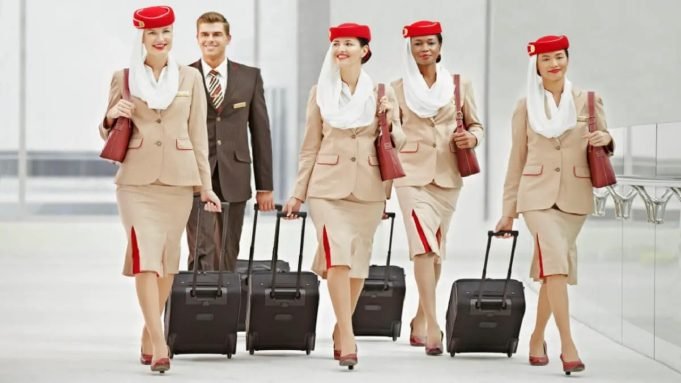Are you interested to know about Flight Attendant Salary? The flight attendant profession is one steeped in history and allure. Serving as the face of airlines, flight attendants play a critical role in ensuring passenger safety and comfort. Beyond the glamorous perception of traveling the world, there’s an intricate web of factors that determine how these professionals are compensated. Hence, understanding the salary dynamics within the aviation industry is not just crucial for aspiring flight attendants, but also for anyone keen on the economics of aviation.
What is the Average Flight Attendant Salary?
Calculating the annual flight attendant salary can be challenging due to its dependence on multiple factors. Consequently, your monthly earnings will be influenced by the number of hours you spend in the air and the quantity of products, like coffee or perfume, you sell to passengers. It’s worth noting that your sales performance is likely to fluctuate based on the flight route and time of day.
For instance, Indeed reports an average base rate of $32,704 for flight attendants in the United States, but this figure does not encompass flying hours, commissions, or layovers. Additionally, you might receive other benefits with a financial value, such as complimentary accommodations or flights. Although these perks aren’t considered part of your salary, they can significantly reduce your expenses, thereby increasing your disposable income.
So, when considering your total annual earnings as a flight attendant, it’s important to take numerous factors into account. According to the US Bureau of Labor Statistics (BLS), in 2020, 80% of flight attendants earned between $30,930 and $84,790 annually, with a median annual salary of $59,050. For more precise estimates, it’s advisable to explore the compensation packages offered by specific airlines.
Factors Affecting Flight Attendant Salaries
Experience Level
Entry-level vs. Senior flight attendants: Like many professions, starting salaries for flight attendants are typically lower than those with years of experience. An entry-level flight attendant might start with a basic salary and earn incremental raises as they accumulate hours and expertise.
Progression and increments with years of service: The more years a flight attendant logs, the higher their potential earnings. Seniority often brings with it benefits like choice routes, better schedules, and consequently, better compensation.
Airlines and Geography
Variation in salaries among major airlines: Major airlines, especially flag carriers, tend to offer better salary packages compared to smaller or budget airlines. These packages may include base salary, allowances, and other benefits.
Regional vs. International Airlines: Flight attendants working for international carriers, especially those flying long-haul routes, might earn more than those working on regional or domestic flights, primarily due to the longer hours and complexities associated with international travel.
Cost of living adjustments by location: Salaries often adjust based on the cost of living in a particular location. For instance, a flight attendant based in New York City might earn more than one based in a smaller town due to the higher living costs associated with metropolitan areas.
Read More: Southwest Airlines Flight Attendants
Type of Flights
Short-haul vs. Long-haul flights: Flight attendants on long-haul flights often earn more because of the extended hours and additional responsibilities. Moreover, the allowances during layovers in foreign countries can add to the overall compensation.
Charter vs. Commercial airlines: While commercial airlines are the standard, there are also charter airlines that operate private or specialized flights. The pay can vary significantly between the two, with charter airlines sometimes offering higher compensations, especially if catering to luxury clientele.
Certifications and Additional Qualifications
Impact of additional training: Flight attendants who pursue further training, such as specialized safety procedures or customer service courses, might find themselves in a better position for promotions or raises.
Specializations and their effect on pay: Within the flight attendant profession, there are specializations such as serving in first-class or business-class sections, or being a lead or purser on a flight. Such positions often require additional training and bring with them increased salaries.
Additional Benefits and Perks

Beyond the base salary, flight attendants enjoy a suite of benefits that further enhance the allure of this profession:
Travel benefits for flight attendants and their families: One of the most coveted perks of being a flight attendant is the ability to travel either for free or at significantly discounted rates. Furthermore, these benefits often extend to immediate family members, allowing them to explore the world at a fraction of the standard cost.
Accommodation and layover perks: When flying long-haul or on routes that require overnight stays, airlines often provide flight attendants with accommodation in comfortable hotels. This not only ensures they get adequate rest but also offers them an opportunity to explore different cities.
Health insurance and retirement benefits: Given the demanding nature of their job, flight attendants usually receive comprehensive health insurance. In addition, many airlines also provide pension or retirement plans, ensuring long-term financial security.
Other non-monetary benefits: The job comes with other perks like flexible schedules, allowing flight attendants to choose their working days in some cases. Uniform allowances, discounts with airline partners (like car rentals or hotels), and an ever-changing work environment are added benefits.
Also Read: Guide to Snagging Last Minute Flights
Comparison to Other Professions in the Aviation Industry
Salaries of flight attendants vs. other roles: While flight attendants earn a decent wage, especially when considering the benefits, their salaries are generally lower than pilots. Ground staff and air traffic controllers typically earn varying amounts based on their responsibilities, experience, and location. For example, air traffic controllers, given the high stakes of their job, are among the top earners in the industry.
Job stability and growth prospects: The aviation industry, by nature, is susceptible to global events, which can lead to fluctuations in job stability. However, experienced flight attendants with seniority often enjoy more job security. The growth prospects are promising, with possibilities of advancing to roles like lead flight attendant or into managerial or training positions.
Current Trends and Future Predictions
Impact of global events (like pandemics) on salaries and job opportunities: The aviation industry was among the hardest hit during events like the COVID-19 pandemic. Flight attendants faced layoffs, reduced hours, or salary cuts. Such global events highlight the vulnerabilities of the industry and its professionals.
Technological advancements and their potential effects: Automation and technological advancements might reshape certain roles in the aviation industry. While the personal touch provided by flight attendants cannot be replaced entirely, some tasks might be automated, potentially affecting job opportunities or roles.
Predictions for the next 5-10 years: The aviation industry is expected to bounce back as global events stabilize, with a predicted surge in travel. Flight attendants will continue to be an integral part of this resurgence, although their roles may evolve with changing technology and passenger expectations.
Challenges and Considerations
Being a flight attendant isn’t always as glamorous as it might appear. Here are some of the challenges and considerations to keep in mind:
The unpredictability of the job: The aviation industry is susceptible to a host of unpredictable events like weather disruptions, technical faults, and global occurrences. Flight cancellations or reschedules can lead to irregular hours and, in some cases, might affect the overall earnings of flight attendants.
Physical and mental demands: The job demands being on one’s feet for extended hours, handling difficult passengers, managing jet lag, and ensuring safety. These physical and emotional challenges, while being rewarding, are strenuous and can take a toll over time. The compensation, although fair in many cases, might not always feel commensurate with these demands.
Read Also: Unforgettable Helicopter Flight Experience
How to Negotiate a Better Salary?
Securing a better compensation package is often a mix of strategy, timing, and self-advocacy. Here are some pointers:
Tips for negotiating during hiring or promotions: Research the standard pay scales for your position and experience level. Be ready to showcase your skills, experiences, and any specialized training that makes you a valuable asset.
The importance of networking and continuous professional development: Building relationships within the industry can open doors to opportunities and give insights into salary standards. Additionally, continuous learning and gaining additional certifications can provide leverage during negotiations.
Utilizing unions or professional associations: Many flight attendants are part of unions or associations that work to ensure fair pay and working conditions. These bodies can provide guidance, support, and even representation during salary negotiations.
Conclusion
The flight attendant profession offers a unique blend of challenges and rewards. While the allure of travel and benefits is undeniable, it’s essential to consider the unpredictability and demands of the job. When it comes to compensation, a proactive approach, backed by research and networking, can make a significant difference. Ultimately, a flight attendant salary is a complex mix of base pay, benefits, and intangible rewards that come with the role.
Frequently Asked Questions (FAQs)
Let’s have a look at some commonly asked questions about “Flight Attendant Salary”:
What Is a Flight Attendant’s Starting Salary?
Various airlines provide varying initial salaries for flight attendants, with the majority offering amounts in the vicinity of $30,000.
How Much Do Flight Attendants Make Per Hour?
The initial hourly wage for a regional airline flight attendant typically hovers around $16.50, with regional carriers generally offering lower compensation.
Nevertheless, it’s important to note that this $16.50 represents the entry-level salary. Flight attendants receive an annual salary increase for a predetermined number of years, ensuring that they won’t remain at the starting wage for long, regardless of the airline they work for.
At top-rated airlines for flight attendants, a senior flight attendant can earn in excess of $70 per hour, and the starting pay can be approximately $30 an hour at some of these top-rated carriers for flight attendants. The salary of flight attendants can fluctuate from one airline to another.
Which Airline Has The Highest Paid Flight Attendants?
Among the leading airlines, Southwest Airlines stands out as the one with the most generous compensation for its flight attendants.
Southwest Airlines achieves this distinction through several key factors:
- Offering the highest hourly wage.
- Implementing TFP, or Trips For Pay, which involves adding extra time to each trip, resulting in flight attendants being compensated for more than just the flight hours, unlike most other airlines.
- Allowing flight attendants to “sell their trips,” meaning that if they wish to avoid a particular trip, they can attach additional compensation to it, making it appealing for another flight attendant to take over the assignment. It’s not uncommon for flight attendants to offer as much as $100 to cover a shorter trip.
Do International Flight Attendants Make More?
On average, international flights tend to be of longer duration and offer a higher per diem pay compared to domestic flights. Since flight attendants receive compensation based on their hourly work, those working on international flights typically earn a higher income.
















[…] quotes highlight the sense of wonder and grandeur of flight attendants associated with their jobs. In the past, they viewed their roles as not merely attendants but as […]
[…] Also Read: Flight Attendant Salary […]
[…] Read More: Flight Attendant Salary […]
Comments are closed.